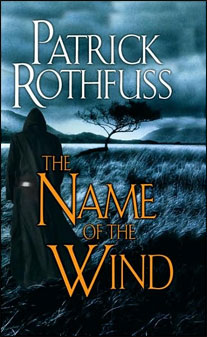I recently read The Name of the Wind by Patrick Rothfuss. I’d heard enormous buzz about this book for months prior to its release, and following that release the buzz seemed to increase a hundredfold. Since epic fantasy (done right) is my favorite form of speculative literature, it goes without saying I was rather curious about this one. But I also went in keeping my expectations in check, because I tend to hold the epics to a higher standard. I’ll admit that these days it’s rare for an epic fantasy to meet my expectations. It’s even rarer when those expectations are exceeded.
That The Name of the Wind blew me away and it is also the author’s debut novel is an absolute testament to Mr. Rothfuss and his skills. This is one of the best debuts I’ve read in a very long time, and with this one book I’m more than willing to admit (quite happily at that) that Rothfuss has already established himself as a writer who we’ll be hearing from for many years to come.
There is a wonderful blend of new and classical elements that make this book fresh and exciting while still managing to press so many of your epic fantasy buttons. As with many epics, this one is quite the brick. The good news is there is a decided absence of filler. The author has a lot to say, whether it is through character development, carefully constructed plot lines unfolding, or introducing us to a world that is absolutely brimming with detail. When you witness the amount of knowledge he wields concerning things such as alchemy, music, herb lore, and countless other topics, all you can do is admire his devotion to telling this tale right.
One thing a bit unusual about this book is that the majority of it is told in first person. While this isn’t unheard of, most epic fantasies don’t go this route. I tend to prefer it this way. IMHO, one of the great appeals of proper epic fantasy is that you never know who might die next. Telling a tale in first person often (though not always) lets you know the narrator is going to be all right, which can ruin the suspense. Fortunately, I didn’t run into that problem here. There are a number of reasons why. Part of the reason is that the author’s voice is so strong he just keeps pulling you along, dropping you ever deeper into the rabbit hole. And I did mention that the majority of this story is in first person, meaning that not all of it is. This choice went a long way toward overcoming my usual dislike for first person epics, as the back and forth between POVs and storylines created a certain suspense of its own.
As to the story itself, I don’t want to ruin it by dropping any serious spoilers, but I should nibble around the plot at least a little. One thing I like about this story is that it deals a lot with names. I don’t know if I can tell you why exactly, but I love it when stories deal with names, especially epic fantasy stories. It just feels …right. And the way Rothfuss plays with names—and also the presentation of his magic school—reminds me, without being derivative, of Ursula K. Le Guin’s Earthsea series. This story is much grittier though, perhaps taking its cue from the modern master of epic grit, George R. R. Martin. And there are really two stories going on in this book, both of them equally fascinating. One is the story of the protagonist, Kvothe, as he tells of his origins and the beginnings of his fame, but there is another story going on as well, which we read about whenever the author veers away from the first person POV. This other tale is far more mysterious, hinting at far darker and vaster things that are coming to a head.
The combination of all these various elements leads to a nearly flawless novel that has left me eagerly anticipating the sequel (The Wise Man’s Fear). To all of you epic fantasy fans who’ve yet to read this one, I urge you to bump it to the very top of your list. You won’t be sorry …until you reach the end and realize there isn’t more to read. :)










